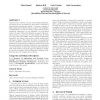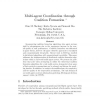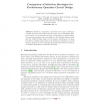1662 search results - page 80 / 333 » The Computational Complexity of Agent Design Problems |
ATAL
2009
Springer
14 years 3 months ago
2009
Springer
Game-theoretic solution concepts, such as Nash equilibrium, are playing an ever increasing role in the study of systems of autonomous computational agents. A common criticism of N...
ATAL
1997
Springer
14 years 1 months ago
1997
Springer
Incorporating coalition formation algorithms into agent systems shall be advantageous due to the consequent increase in the overall quality of task performance. Coalition formatio...
FC
2005
Springer
14 years 2 months ago
2005
Springer
We suggest a general paradigm of using large-scale distributed computation to solve difficult problems, but where humans can act as agents and provide candidate solutions. We are e...
ICCBR
2001
Springer
14 years 1 months ago
2001
Springer
It is useful for an intelligent software agent to be able to adapt to new demands from an environment. Such adaptation can be viewed as a redesign problem; an agent has some origin...
GECCO
2004
Springer
14 years 2 months ago
2004
Springer
Evolution of quantum circuits faces two major challenges: complex and huge search spaces and the high costs of simulating quantum circuits on conventional computers. In this paper ...



